高中英语Unit3UnderstandingeachotherTask1教学设计牛津译林版选修6
牛津版高中英语选修6 Unit 3 Understanding each other- Task课件(共25张PPT)
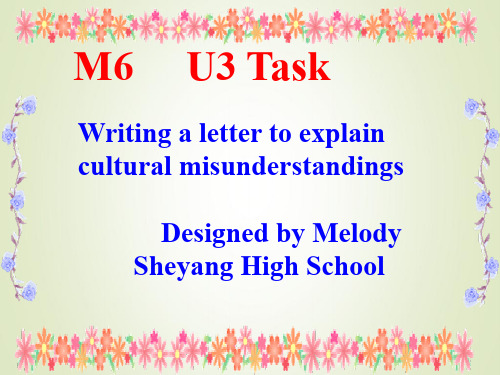
Wouldn’t get on a boat, thinking it was too
crowded.
Act out the situation
Mr. Singh refused to shake my left hand; wouldn’t eat beef.
Mr. Takashi got upset when I put his business card in my pocket without looking at it.
_m__o_n_e_y__.
Skills building 2: asking for information P44
things; places; people
what
the way
how
one out of several possibilities
which
time
when/at what time
someone something in India.
New questions:
propose a toast 敬酒, 举杯
Guests’ strange behaviors
Singh wouldn’t shake my left hand or eat beef.
Takashi bought lots of gifts and got upset when people didn’t look at his business card.
1. the feeling of Americans when people stand too close to them.
2. the way South Americans greet people. 3. the important thing in Japan. 4. the hand that shouldn’t be used to give
英语:高三一轮复习教案 Unit3 understandin each other(牛津译林版选修6)
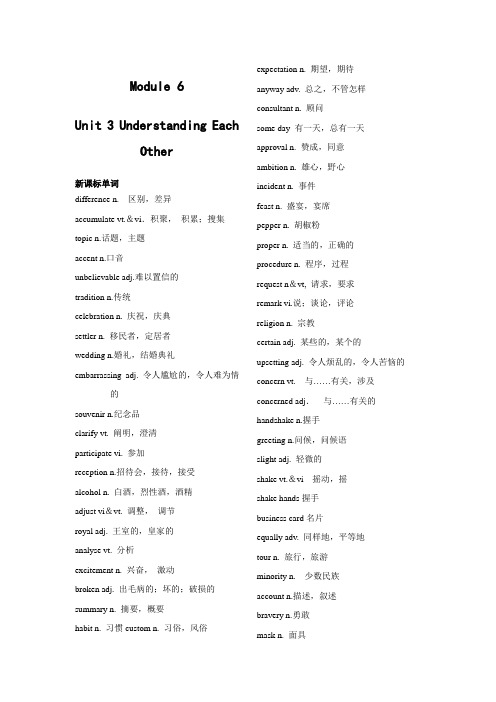
Module 6Unit 3 Understanding EachOther新课标单词difference n. 区别,差异accumulate vt.&vi.积聚,积累;搜集topic n.话题,主题accent n.口音unbelievable adj.难以置信的tradition n.传统celebration n. 庆祝,庆典settler n. 移民者,定居者wedding n.婚礼,结婚典礼embarrassing adj. 令人尴尬的,令人难为情的souvenir n.纪念品clarify vt. 阐明,澄清participate vi. 参加reception n.招待会,接待,接受alcohol n. 白酒,烈性酒,酒精adjust vi&vt. 调整,调节royal adj. 王室的,皇家的analyse vt. 分析excitement n. 兴奋,激动broken adj. 出毛病的;坏的;破损的summary n. 摘要,概要habit n. 习惯custom n. 习俗,风俗expectation n. 期望,期待anyway adv. 总之,不管怎样consultant n. 顾问some day 有一天,总有一天approval n. 赞成,同意ambition n. 雄心,野心incident n. 事件feast n. 盛宴,宴席pepper n. 胡椒粉proper n. 适当的,正确的procedure n. 程序,过程request n&vt, 请求,要求remark vi.说;谈论,评论religion n. 宗教certain adj. 某些的,某个的upsetting adj. 令人烦乱的,令人苦恼的concern vt. 与……有关,涉及concerned adj.与……有关的handshake n.握手greeting n.问候,问候语slight adj. 轻微的shake vt.&vi 摇动,摇shake hands握手business card名片equally adv. 同样地,平等地tour n. 旅行,旅游minority n. 少数民族account n.描述,叙述bravery n.勇敢mask n. 面具spirit n. 灵魂,幽灵,精灵belief n. 信仰govern vt. 统治instrument n. 器械,器具;仪器belong vi. 属于flat adj. 平坦的;扁平的power n. 权力;能力;力量retell vt. 复述,转述课文出现短语1. shake hands with2. kiss sb on the cheek3. experience differences4. in celebration of5. celebrate wedding6. take up7. give out business cards8. get held up9. log off/on10. come to this topic11. wear yellow12. give presents to13. adjust …to14. set off firecrackers15. some day16. go through17. in contact with18. be concerned with19. be clever at20. take the opportunity21. break a taboo22. greet one another23. get upset24. have huge collections of 25. hunt for26. participate in27. body language28. belong to29. have power over30. meet with31. have the chance to do32. for yourself33. be connected with34. be linked to35. provide …with36. have ambition to do37. interact with38. as cool as a cucumber39. take part in40. expect to be done41. the person concerned42. enable sb to do43. be carved from44. make pieces of jewellery45. steam sth over hot stones46. hunt for/ after47. get to learn about sth.48. hunt animals49. be home to …50. be rich in51. meet with52. go night fishing53. be known as54. smoke a peace pipe55. roast sth. over an open fire一.单词应用根据单词的首字母或汉语意思填写正确单词,注意形式变化。
Unit3Understandingeachother-Task课件1(译林版选修6)
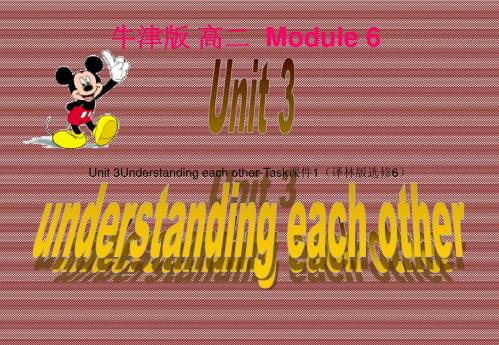
Suggested answers
1. What food do the people from India not eat?
2. Which hand shouldn’t be used to shake hands with or give things to people from India?
You want to write a letter of apology to the foreign visitors to explain misunderstandings. Find a partner and discuss what to include in the letter. Each person should write a different part.
6. Why do people from the USA do not like crowded places?
Skills building 3: writing a letter of apology
When writing a letter of apology, you need to include the following: • your address • the date • an opening
Tips on completing a text by listening: 1. Make sure you read the text first so you
the subject of the text and the type of words that you are likely to hear.
Practice
You want to ask your classmate about the following things. Form your questions with the correct question words first, and then find a partner to answer questions. Answers can be found in the magazine article on page 43. Take turns asking questions.
【教案】高中英语Unit3Project教案1牛津译林版选修6
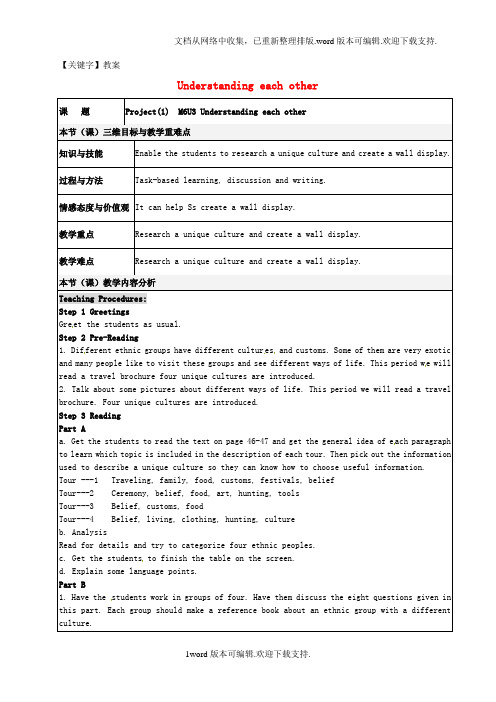
【关键字】教案Understanding each other课题Project(1) M6U3 Understanding each other本节(课)三维目标与教学重难点知识与技能Enable the students to research a unique culture and create a wall display. 过程与方法Task-based learning, discussion and writing.情感态度与价值观It can help Ss create a wall display.教学重点Research a unique culture and create a wall display.教学难点Research a unique culture and create a wall display.本节(课)教学内容分析Teaching Procedures:Step 1 GreetingsGre et the students as usual.Step 2 Pre-Reading1. Dif ferent ethnic groups have different cultur es and customs. Some of them are very exotic and many people like to visit these groups and see different ways of life. This period w e will read a travel brochure four unique cultures are introduced.2. Talk about some pictures about different ways of life. This period we will read a travel brochure. Four unique cultures are introduced.Step 3 ReadingPart Aa. Get the students to read the text on page 46-47 and get the general idea of e ach paragraph to learn which topic is included in the description of each tour. Then pick out the information used to describe a unique culture so they can know how to choose useful information. Tour ---1 Traveling, family, food, customs, festivals, beliefTour---2 Ceremony, belief, food, art, hunting, toolsTour---3 Belief, customs, foodTour---4 Belief, living, clothing, hunting, cultureb. AnalysisRead for details and try to categorize four ethnic peoples.c. Get the students to finish the table on the screen.d. Explain some language points.Part B1. Have the students work in groups of four. Have them discuss the eight questions given in this part. Each group should make a reference book about an ethnic group with a different culture.2. Have each group present their reference book to the whole class . After students have all read the books , let them choose which book they think is the best .Step 4 Language study1. We offer you the chance to v isit different minority cultures and experience for yourself their traditions, customs and way of life.(P46L2))▲minority(1)n.少数民族The school is 95 percent minority.(2)n.少数,不够半数The nation wants peace, only a minority wants the war to continue.(3)adj.少数人的,少数人支持的I agree with the minority opinion.提示:minority的反义词是 majority,两者作主语时,要根据其后的名词形式来决定谓语动词的单复数。
译林牛津版高中英语课件 选修六Unit 3 Understanding each other__Reading 1
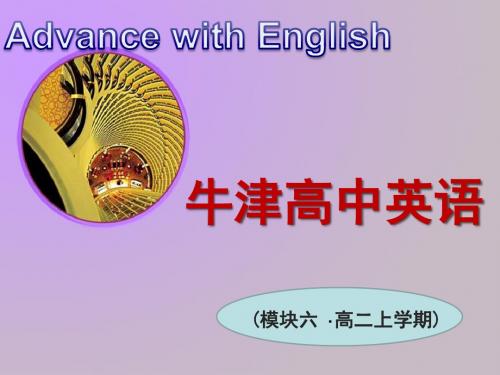
• 1. Try to find out the sentences supporting the argument that there are differences as well as similarities between West weddings. • 2. Try to find out the example used as an interesting story about cultural misunderstanding.
The text we read is a dialogue on cultural differences. So in this kind of text we should use examples to explain concepts and ideas. Sometimes we use examples to support arguments and sometimes used as interesting stories.
• Which of the following words indicate the right attitudes towards cultural differences?
respect A.respect B. tolerate tolerate C. look down upon D. appreciate E. hate F. understand G. refuse
Task2 Careful reading
Read the text quickly and accurately. Then find the answers.
1) Why do the Korean have a live hen and a rooster as a part of the wedding ceremony? 2) In the West, when is the polite time to open a present? Why? 3) What can you not drink at a wedding in Brunei? 4) What should you do instead of pointing with your first finger in Brunei? 5) What is the festival of Bonfire Night? What is eaten at Bonfire Night?
英语Unit3《Understandingeachother》Task课件(译林牛津版选修6)
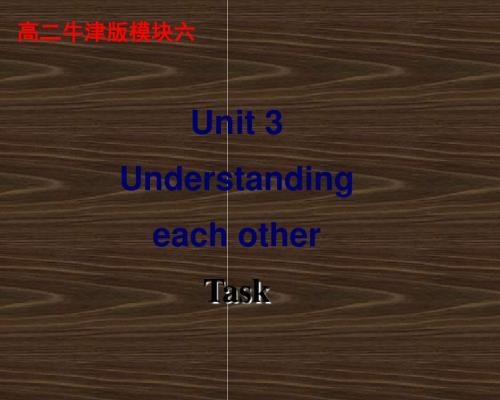
Listen to the tape again and try to answer the following questions:
1. Which tourist attractions did the two students show the three foreigners around?
The Forbidden City and the Summer Palace.
2. Why did the writer feel strange about Mr. Singh?
Because he wouldn’t shake hands when the writer held out his left hand and refused to try the beef dish.
5. In Japan, the same gesture means _m__o_n_e_y________.
Skill building 2: asking questions
1. How do you usually ask questions? 2. What expressions do you usually
Listening practice:
Listen to the recording and fill in the missing words. You may check your guesses at the same time.
Had a great day yesterday. We showed(1) _t_h_r_e_e_visitors around Beijing. They seemed to enjoy it although there were some (2)__u_n_u_s_u_a_l__ incidents. One man called Mr. Singh _w_o_u_l_d_n_’_t shake hands with me when I held out my left hand. In the restaurant, we ordered a lot of food, but he would not eat the (5)___b_e_e_f ____ dish.
(新课标)2021高考英语一轮总复习Unit3Understandingeachother教案牛津译林版选修6
Unit 3 Understanding each other对应学生用书p99重点短语,汉译英1.更不用说2.习惯于3.占据(时间或空间)4.毕竟5.赶走6.脱掉7.对……感到熟悉8.寻求9.参加10.做某事有困难11.发出(光/热等) 12.相信13.带某人参观,游览14.控制,支配[答案]1.letalone2.get/beaccustomedto/getusedto3.takeup4.afterall5.drive...away6.takeoff7.befamiliarwith8.huntfor9.takepartin10.havetrouble (in) doingsth.11.giveout12.believein 13.showsb.around 14.havepowerover句型操练·背诵与仿写,1.Manyforeigners havetroublegetting accustomedtoit.(P35,L3940)那些新来的人对这里的气候很难适应。
Thenewcomers .2.Theydislikeitwhen peopledonotlookatthecards,soremembernottojustputtheminyourpocketwithoutlooking.(P43,B)他们很欣赏物理老师总是那么认真地批改作业。
Theyappreciate.3.Whilestayingwith theInuitpeople youwillhavethechance torideonadogsledandtra velinasealskinboat.(P46,L57)仿写在采访期间,你有可能见到那位科学家。
While ,you .4.Thereare manydifferenttribes that belongtotheNativeAmericanIndiangroup.(P47,L4849)仿写任何事都无法阻止中国人民前进。
牛津译林版高中英语选修六Unit3UnderstandingeachotherProject教学设计
Unit3 Understanding each other Project教材:牛津高中英语(模块六)高二上学期文档内容:教学设计—教案单元:Unit 3 Understanding each other板块:ProjectThoughts on the design:本节课要紧目的是引导学生进行探讨性学习。
Project 共有两个部份,第一部份是提供有关的阅读材料,通过阅读一篇与本单元话题有关的阅读材料和展现大量而生动的图片来体验不同的民族风情和所产生的文化不同。
为完本钱课任务Making a reference book提供范例,扩充学生文化信息,拓宽学生视野,让学生从中受到启发,引发用英语开展某一活动的爱好,而且为学生的顺利表达作铺垫。
第二部份是project本身,设计有四个步骤:Planning:在老师引导下通过讨论确信课题;组内分工;Preparing:查找资料、搜集信息、调查访谈、小组讨论;Producing:拿出初稿,对其进行加工、完善;Presenting:交流汇报,展现各个小组的功效。
学生在老师的指导下,通过小组讨论、分工合作、调查访谈、信息检索、交流汇报等形式的活动,用英语去做一件情形,最后呈现学习功效,制造性地完成学习任务,培育综合运用语言的能力。
Teaching aims:After learning this part, the students will be able to:1. read a travel brochure about minority cultures around the world;2. make a reference book with the result of research a unique culture;3. develop the ability to finish a project by working together;4. master some useful vocabulary and sentences.Teaching procedures:Step 1: lead in (PPT4-12)Every country has some or many ethnic groups.(1) How many ethnic groups do we have in China?(2) Do you know any different cultures and customs between th ese groups?(3) What about the ethnic groups in other countries in the world?[Explanation]这一环节的三个问题和大量的图片主若是为了导入A部份的阅读,能够让他们了解一下中国少数民族的情形,体验一下民族风情也激发了他们已有的知识和思维能力。
高中英语 Unit 3 Understanding each other单元小结教学案 牛津译林版选修6
1 Unit 3 Understanding each otherI once went to a minority's wedding . Awedding is the ceremony or celebration of amarriage. They had a live rooster as a partof the wedding ceremony.According to theirreligion , roosters are supposed to drive badspirits away from the wedding ceremony. Thebridegroom greeted the bride with a loving hug . Everyone congratulated the new couple with a strange gesture . There was also a dance and a feast in the wedding. People wore masks carved from wood and danced in honor of their ancestors, who killed deer for food with bows and arrows . At wedding receptions alcohol is not permitted . In fact, alcohol is altogether prohibited . Such an offence will lead to a fine.I was not familiar with their customs, so I tried to adjust to doing that. Many foreigners have trouble getting accustomed to it, too.我曾经参加过一个少数民族的婚礼。
牛津译林版高中英语选修六Unit3UnderstandingeachotherGrammar教学设计
Unit3 Understanding each other Grammar and usage教材:牛津高中英语(模块六)高二上学期文档内容:教学设计—教案单元:Unit 3 Understanding each other板块:Grammar and UsageThoughts on the design:本节课是一节语法教学课。
依照中学语法教学的目的,语法教学应在语篇中进行语法教学;在创设情景中进行语法教学;在完成任务中进行语法教学。
这节课的要紧目标是达到学习虚拟语气一样条件句的三种时态的不同结构和一样条件句的倒装结构。
通过文字、表格和练习对虚拟语气讲解,使得复杂的语法通俗明了,浅显易懂;再利用设计好的语言情景,加以运用和巩固,以笔头、口头等多种形式将语法练习有机地、灵活地融会于各类课堂任务当中。
通过对照归纳,有助于学生从整体上进行把握,帮忙学生将语法知识加以巩固和“内化”,以培育学生自主学习与探讨的能力,提高准确利用语言的能力。
Teaching aims:After learning this part, the students will be able to:1. use unreal conditionals of the present, past or future time;2. improve reading abilities and the ability of using unreal condit ionals;3. master some useful language points.Teaching procedures:Step 1 Lead-in1. Translate the following sentences on the blackboard.若是我是一只小鸟,我就能够飞了。
If I w ere a bird, I could fly.Is it possible for you to be a bird?The situations are not real or are imaginary. We call them unreal conditionals. Unreal conditionals state a condition or situation that is not real or is imaginary.2. Find out the unreal conditional sentences mentioned in the reading part.If you had joined the chat room ten minutes ago, you would have known what we were talking about. If I got married in the UK, I would expect a present.If I got married in Italy, I would have to give a present.Should you come to Brunei, you would have to take off your shoes before going into someone’s house. [Explanation]为了使枯燥的语法课变得生动有趣,因此在导入部份用了一句浅显易懂的句子导入新课,让学生明白什么是虚拟语气,然后通过温习的方式将阅读课中显现的虚拟语气句一一找出,对虚拟语气有进一步的了解。
- 1、下载文档前请自行甄别文档内容的完整性,平台不提供额外的编辑、内容补充、找答案等附加服务。
- 2、"仅部分预览"的文档,不可在线预览部分如存在完整性等问题,可反馈申请退款(可完整预览的文档不适用该条件!)。
- 3、如文档侵犯您的权益,请联系客服反馈,我们会尽快为您处理(人工客服工作时间:9:00-18:30)。
Unit3 Understanding each other Task1 教 材:牛津高中英语(模块六)高二上学期 文档内容:教学设计—教案 单 元:Unit 3 Understanding each other 板 块:Task 1
Thoughts on the design: Task板块的主要目的是写一封关于解释文化误解的道歉信。本节课的主要目的是听读结合,引导学生在完成任务的过程中使用英语,并以各种任务的形式培养学生听、说和读的技能。该节课的内容是以解释文化误解为主线,要求学生将听到的和读到的材料转换成填空的形式,让学生在教学活动中用英语参与和完成各种真实而有意义的任务,从而培养获取信息的能力。为了达到这个目标我们可以分以下三步来走,但这节课只要完成一半任务Step1:为了写这封信首先要获取信息(SKILLS BUILDING1),这部分教会学生怎样找到有用信息,可以利用step1里面的材料
Teaching aims: After learning this part, the students will be able to: 1. listen to two dialogues to fill in the blanks;
2. read a passage to find out the taboos; 3. understand the cultural differences; 4. develop listening and reading ability. Teaching procedures: Step 1: Lead in (PPT4)
Today we’ll complete a text by listening. Before that, we should make it clear
that what we should do before and after listening and how we use the skills in practice. Answer the following questions by reading the guidelines on P42. Before listening: What is the first thing we need to do before listening? Why should we do this? What should we do next? How can we decide what the missing words probably are? What is the fourth point about? After listening: What do you think we should do after we have finished a passage? [Explanation] 通过问问题的形式将书上的任务指导展示给学生,然后将重点拿出来放在课件上,这样学生对如何通过听来完成上下文就非常清晰。 Step 2: Reading and listening (PPT5-7) 1. Read the text on P42 quickly to get the main idea of it and try to guess what words will be filled in the blanks. 2. Listen to the tape and complete the text. 3. Listen to the tape again and fill in the table. Name Nationality Strange incidents (things)
Mr. Singh Indian 1. Got upset when I put out my left hand to shake hands with him.
2. He wouldn’t eat the black pepper beef.
Mr. Takashi Japanese 1. Bought many gifts. 2. Got upset when my classmate put his business cards in his pocket without looking at it. 3. Kept making an OK sign. Mr. Hudson American Though there was lots of space, he wouldn’t get onto the boat because he thought it was too crowded. 4. To get more information about cultural habits, listen to another monologue and finish the blanks on Part C. [Explanation] 这一环节主要任务是通过听,完成空格和图表来训练听的能力。掌握教材需要学生达到的听的技能。将Part C提前与Part A 一起上,这样的设计主要是为了降低听的难度,为中等学生作好铺垫工作,增强他们听的自信心和兴趣。 Step 3: Reading(PPT8-10) Read the passage on Part B and circle the taboos that help explain some of the strange incidents that happened when you showed the visitors around. Suggested answers: If you are from India, you may not eat beef because of your religion. If you are from the West, you probably would not like to eat chickens’ feet In India, it is impolite to shake hands or give someone something with your left hand. Remember not to just put the business cards in your pocket without looking in Japan. [Explanation] 这一环节主要是为了帮助学生了解更多的文化差异不至于在跨文化学习中产生误解。并且通过快速阅读提取信息来训练学生的阅读能力。 Step 4: Language points (11-15) 1. Translate the following phrases and remember them. 带某人到处转转 take/show sb. around 碰到一些奇怪的事情 come across some strange incidents 点了一份真正的大餐order a real feast 紫禁城 the Forbidden City 应付,处理 do with 占据(时间和空间)take up 分发名片 give out business cards 有些不高兴 get a bit upset 经历适当的过程go through the proper procedure 作一个OK的手势 make an OK sign 请求帮助(request) make a request for help 颐和园 the Summer Palace 被堵塞了/ 被耽搁了be /get held up Fill in the blanks with the right words and phrases: show … around; hold out; do with; take up; shake hands with; go through; hold up; incident; remark; give out; 1. We ________ the visitors ________ our school. 2. Some strange ________ occurred to me. 3. Chinese people like to _________________ each other when they meet. 4. I have no idea what he will _________ so many presents. 5. It was very odd how he reacted when you _________ your left hand to shake hands. 6. The Japanese always __________ their business cards when they meet each other. 7. You broke the rules here because you didn’t ___________ the proper procedure. 8. The building of the road got ________ by bad weather. 9. Studying _________ most of my time. 10. As he often _________, one is never too old to learn. [Explanation] 在两段听力材料和阅读材料中出现了很多有用的词汇,尽管这节课的主要任务是听和读,但是语言积累应是发生在任何一种课型中,所以这些语言点的训练也是很重要的。 Step 5:Homework(PPT16-18) 1. 他说的话没有意义。 (make sense) What he said made no sense. 2. 你看明白这篇文章的意思吗?(make sense of) Can you make any sense of the article? 3. 我们学校已经订购了大量的教学设备。(order) Our school has placed an order for a large quantity of teaching equipment. 4.我不知道怎么处理这些退货。 (deal with) I don’t know how they will deal with those rejected goods. 5. 这个演讲和我的医学研究有关系。(do with ) The lecture is to do with my study on medicine. 6. 我很抱歉占用了你这么多宝贵的时间。 I’m sorry to have taken up much of your valuable time. 7. 她的孩子在超市里走丢了,令她十分担心。 Her son was lost in the forest, which concerned her much. My son lost his way in the forest, and it made me concerned. 8. 他非常担心他儿子的安全。 She was very concerned about his son’s safety. 9. 就这优质的服务而言,这个价格是合理的。 As far as the good service is concerned, the price is reasonable. 10. 我在这样的紧急情况下怎样才能联系到你呢? How can I contact you while I am in such an emergency?
